RECOIL OFFGRID Survival Safe In The City: Reducing Your Personal Criminal Risk Profile in Highly Populated Areas
In This Article
Cities are full of life and can be fantastic; on the other hand, they can also seem to be more trouble than they’re worth. Because cities have higher populations, they also have more of everything. This increased concentration of people results in greater depth of food, culture, concerts, shows, shopping, sporting events, and life in general. Along with this comes an increased risk of criminal victimization, but there are tangible ways to reduce your criminal risk profile through thoughtful planning and consideration. This article isn’t necessarily for those who already live in urban areas — those who do usually already intrinsically know much of this — but for those who are less familiar and perhaps have a skewed view of risk due to depictions in the media.
Thanks to profitability of news outlets being based on eyeballs for advertisers, there’s an evolutionary pressure to highlight the horrid and downplay successes. The phrase “if it bleeds it leads” exists for a reason — harrowing and horrific tales activate the limbic system and induce fight-or-flight reactions, effectively forcing us to pay more attention, to watch more and watch longer. Our brains aren’t wired to make us happy but to keep us alive. And this biological hijacking for views distorts our own perceptions of safety, regardless of the actual risk.
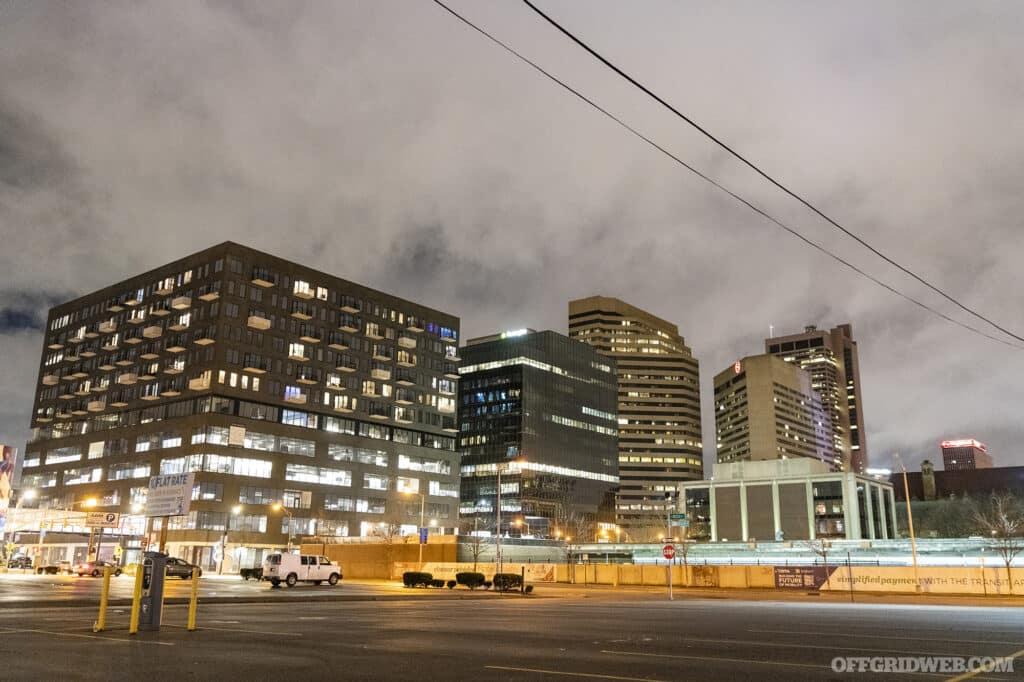
Above: Transitional zones like parking garages and dark parking lots are places where criminals search for targets of opportunity.
Despite heated headlines and raving rhetoric blared by the 24-hour news cycle and grandstanding politicians, interpersonal crime is statistically rare. Times of uncertainty correspond with a temporary increase in criminal activity, but it’s not a continuous trend. Violent crimes of all stripes have been precipitously dropping since 1990, with a bump in 2001 from stressors of Sept. 11 and another in 2020 with the pandemic and lockdowns (which has already greatly calmed).
Additionally, not all crime is created equally. It’s not that some crimes don’t matter — the crimes we primarily need to concern ourselves with as temporary visitors are different than for a permanent resident. Here we’re not just talking about personal, violent crimes such as murder, assault, sexual assault, and robbery, but the smaller opportunistic subset of those terrible offenses.
This article isn’t about how to fight once the fight is on; it focuses on methods to avoid trouble in the first place. The most successful fight is the one you don’t have, not the one where the fight happens and you come out the victor.
Criminals look for easy marks, those who present a high likelihood of success while minimizing their personal risk. Not looking or acting like a target makes you less likely to be a target. Avoid outward displays of wealth such as expensive (or expensive-looking) shoes, watches, and other adornments. Act like you belong, walk with a purpose rather than with furtive movements in high-traffic public areas, and walk more casually like you live there in more-residential ones. Don’t openly count money, read maps, or generally look like you’re lost. While you’re walking, don’t stop for strangers accosting you for any reason. Along similar lines, there’s some safety in numbers — two or three people are harder to victimize than someone on their own.
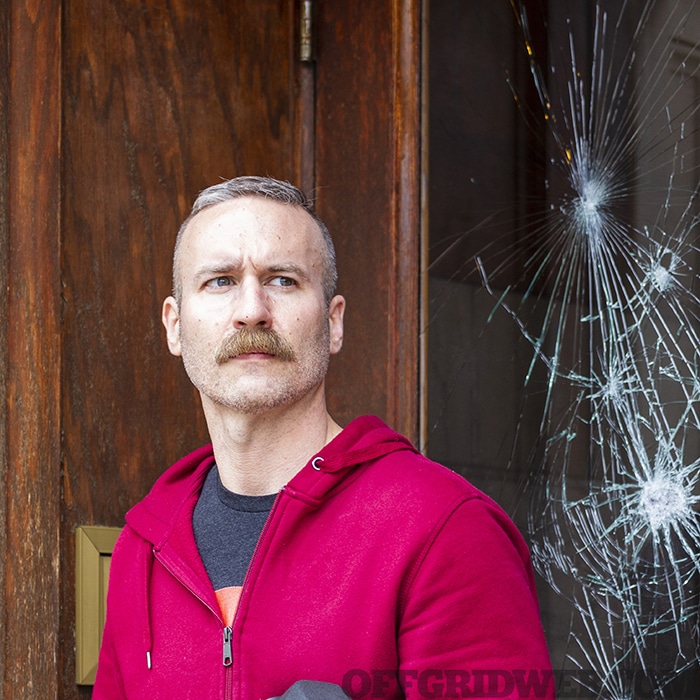
Above: Author Dave Merrill scans for potential trouble while remaining calm and confident.
A projection of confidence, even when you’re not actually confident, can go a long way.
The dirty secret of gun crime, especially murders in the United States, is that it’s highly concentrated in only a handful of realms. If you don’t participate in the illicit narcotics trade — the purchase, sale, manufacturing, or transportation of illegal drugs — and can afford to live outside an area where illicit narcotics trades occur, your odds of being shot and killed are infinitesimal. And even then, that murder is likely to be perpetrated by a friend or family member.
You greatly reduce your odds of being victimized if you don’t partake in black-market criminal enterprises. Don’t buy drugs, don’t procure the services of a commercial sex worker, and don’t take part in underground gambling. Setting aside any moral issues and potential legal entanglements, these activities are far more personally dangerous for two main reasons: the odds of legal recourse are low because the victim is also breaking the law themselves, and they usually involve larger amounts of physical cash.
While it’s true that credit cards and debit cards can be stolen and used, their use requires a slightly higher level of criminal sophistication to avoid being caught and prosecuted versus cold, hard cash.
Stupid places are not just areas where illicit activities take place, but also where people have reduced behavioral inhibitions. Yes, we’re talking about alcohol. Bars, night clubs, strip joints, et al. are all places with higher risk factors, which only increase as the night goes on, peaking in the nearby parking lots when these establishments close. Ego, alcohol, and outsiders are rarely a winning combination regardless of the population density of the area.
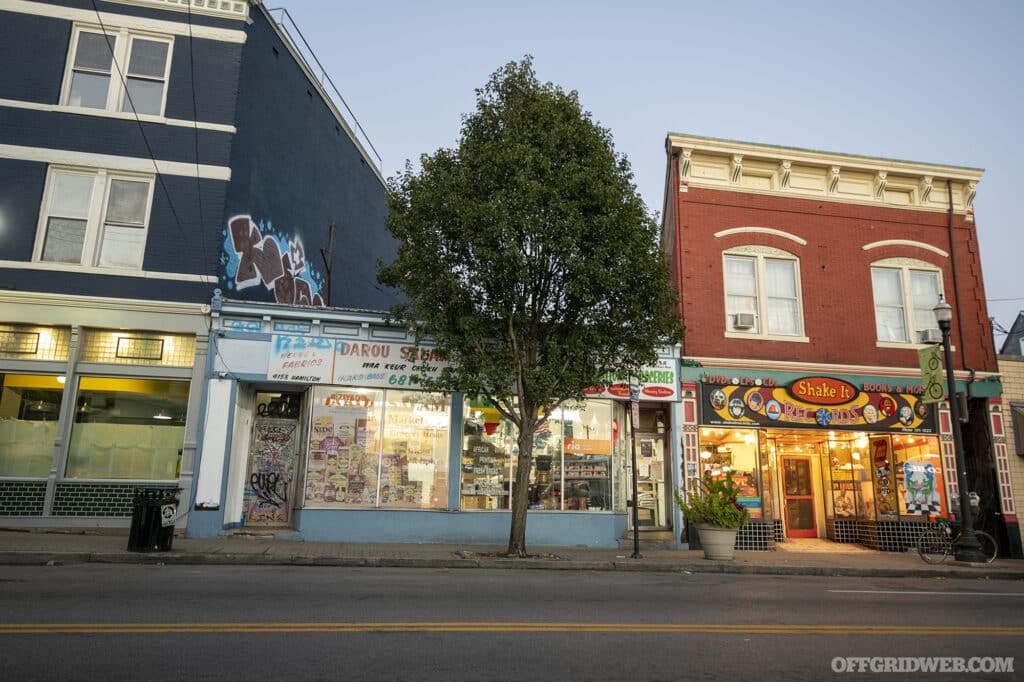
Above: Businesses that rely more on cash sales are tantalizing targets.
Businesses that rely more on cash sales have a much higher risk of being subject to burglary and robbery, because while a bustling suburban Whole Foods Market has a daily sales number an order of magnitude higher than a small corner bodega, the vast majority of the money running through that Bezos business is digital. The risk of being witness to a robbery or being robbed yourself also increases based on proximity to easy egress routes — think a small cash-based business alongside a major highway at night.
Transitional zones such as stairwells and dark parking garages can also be considered stupid places and present opportunities for the criminally minded. Depending on the layout of the city and the resources available, it’s often better to take public transportation such as a subway or a taxi/rideshare service to avoid these transitional zones.
Even in an extremely bad area, not every inch of land will be bad, and even the most dangerous places won’t be bad every minute of the day. The most dangerous place in any city in the world between 7 a.m. and 10 a.m. are the highways that crisscross them, and even so-called “safe” places carry higher risks of victimization during times of darkness late at night into the early morning hours.
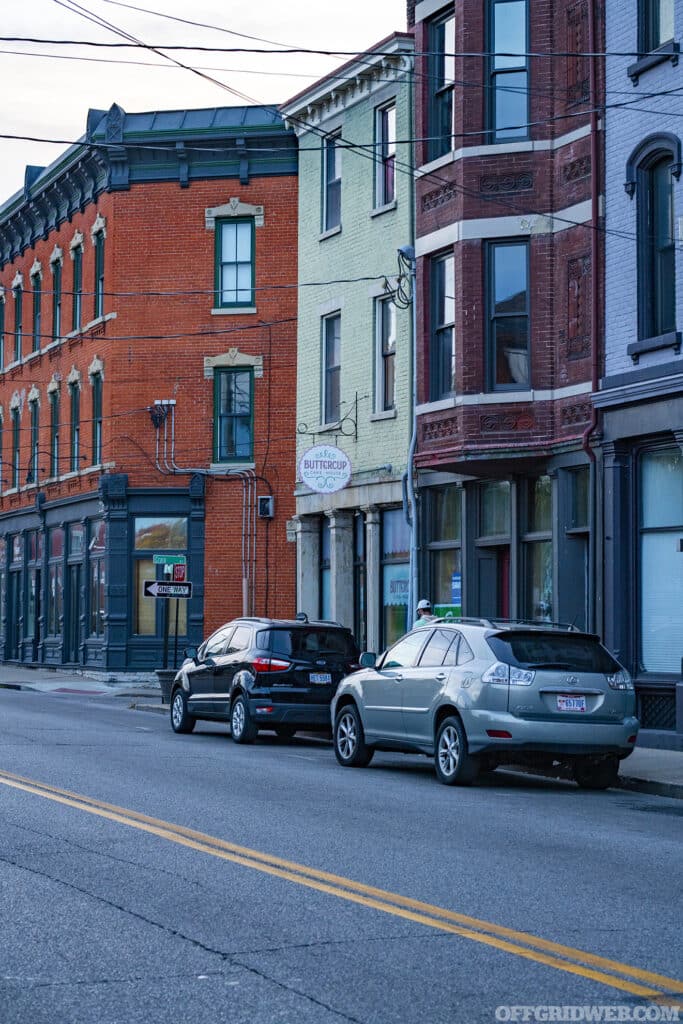
Above: Violent crime isn't the only danger in an urban area. Often careless drivers on busy streets present a larger threat.
“Stupid people” in this case are the ones who want to go to stupid places, do stupid things, and do them at stupid times. If you have a friend or family member who seems to be a magnet for trouble, the common thread with all of that trouble is them. This isn’t to say you can’t be friends with someone like that — they’re often quite fun to be around — but definitely be choosey about what you do and where you go with them.
There are a multitude of websites and smartphone apps that’ll give you maps and alerts of crime information, but they’re less useful than they appear on the surface. One of the issues with crime data you’ll find on the internet is that you have relatively little information. Take a listing of “assault,” for example: the location and perhaps time of the reported crime is all you’ll usually get. You won’t know any of the circumstances, like if it was a false report or a domestic issue — while domestic assault is awful, it has nothing to do with outsiders visiting the area. Typically, when we ingest incomplete information like this, we assume the worst: that the assault was on a stranger, like us, and that it would apply to us in that area. There’s some survival benefit to this type of catastrophizing, but this type of negative thinking also warps perceived danger.
These apps can be helpful to view general trends and to highlight areas of higher criminality, but over-focusing on raw data will only increase fear and anxiety. Use these resources but use them sparingly. Like talking heads on the TV, app developers have a vested interest in keeping you glued to the screen.
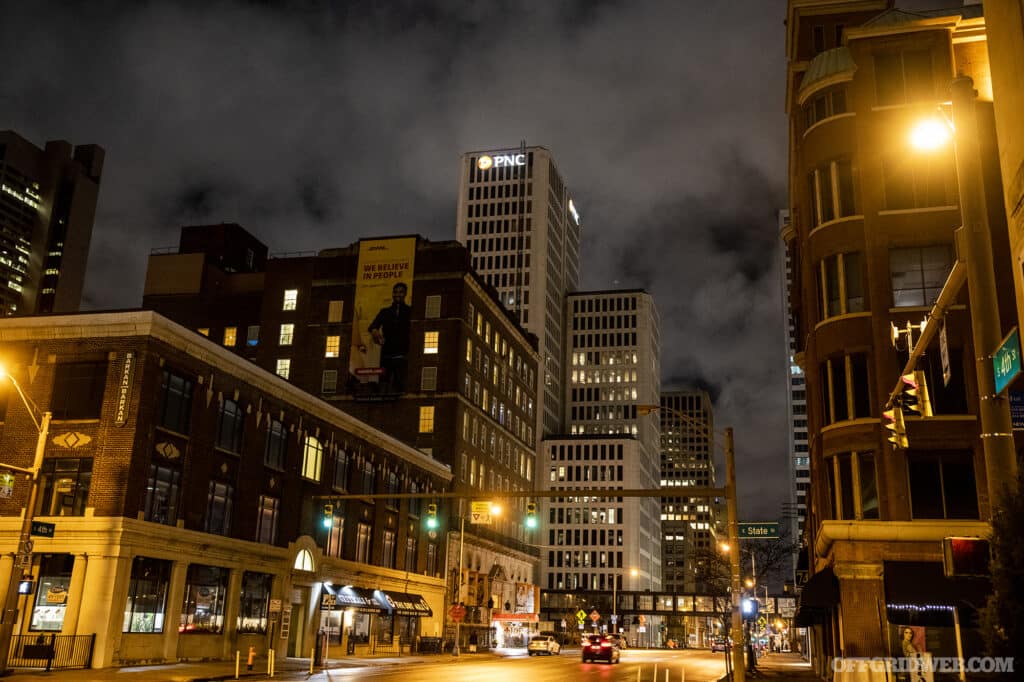
Above: Urban areas often get more bad publicity than good thanks to common media practices.
While much of this article is focused on violent crime, dying due to a car accident makes you no less dead than being murdered by a stranger. Apps are actually extremely useful to note the most common locations and intersections for automotive accidents. Defensive driving is never cool or sexy, but it has a much greater impact on safely getting you from point A to point B. You can’t control the actions of other people, but you can control what you do. The risk of a traffic incident not only increases during times of higher density of traffic, but also the later in the evening you drive. People under the influence are more likely to be on the road after 9 p.m., continuing until about an hour after the local bars and other drinking establishments close.
This advice is boring, but wear your seatbelt, look both ways at intersections or before crossing the street, and don’t text and drive.
While this article is more of a high-level view of risk mitigation, there are resources and courses you can take that delve more into the nitty-gritty. Drawing from his more than two decades of law enforcement experience, especially his work in counter-narcotics, Craig Douglas of ShivWorks teaches some tremendous classes on the importance of pre-engagement tactics and how to manage unknown contacts, as well as your best actions for success when and if that fight actually starts.
Cities are far from the cesspools some say they are, but even in the safest cities in the world you can find trouble if you go looking for it — so don’t go looking.
 STAY SAFE: Download a Free copy of the OFFGRID Outbreak Issue
STAY SAFE: Download a Free copy of the OFFGRID Outbreak Issue
No Comments